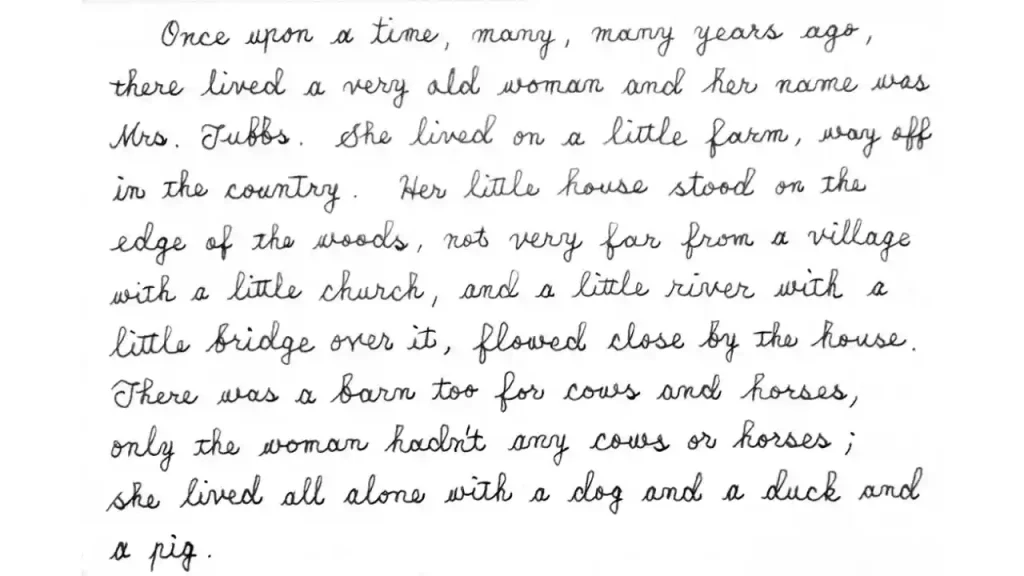Once upon a time, many, many years ago, there lived a very old woman and her name was Mrs. Tubbs.
The Story of Mrs. Tubbs
- modifier: ずっとむかしに
- subject: おばあさん
- predicate: くらす
日本語訳:
ずっと昔に、とても長生きのおばあさんが暮らしていました。彼女の名前はミセス・タブスでした。
- 昔(むかし, long time ago)
- 長生(ながいき, longevity)
She lived on a little farm, way off in the country.
- subject: かのじょ
- predicate: すむ
彼女は田舎の外れにある小さな農場に住んでいました。
- 田舎(いなか, countryside)
- 農場(のうじょう, farm)
Her little house stood on the edge of the woods, not very far from a village with a little church, and a little river with a little bridge over it, flowed close by the house.
- subject: おがわ
- predicate: ながれる
彼女の小さな家は森の外れにありましたが、小さな教会のある村からはさほど離れていませんでした。小さな橋のかかった小川が家のそばに流れていました。
- 小川(おがわ, stream)
- 村(むら, village)
There was a barn too for cows and horses, only the woman hadn’t any cows or horses; she lived all alone with a dog and a duck and a pig.
- subject: かのじょ
- predicate: ひとりぐらし
ウシとウマのための小屋もありましたが、どちらもいませんでした。
彼女は一人暮らしでした。一匹のイヌと、一匹のアヒルと、一匹のブタと一緒に。
- 小屋(こや, shed)
- 一人暮らし(ひとりぐらし, living alone)
The dog’s name was Peter Punk, the duck’s name was Polly Ponk, and the pig’s name was Patrick Pink.
そのイヌの名前はピーター・パンク。
そのアヒルの名前はポリー・ポンク。
そのブタの名前はパトリック・ピンクといいました。
The old woman called them Punk, Ponk and Pink for short.
おばあさんは彼らを、パンク、ポンク、ピンクと名前を短く呼んでいました。
Punk and Ponk had known one another for many years and were very good friends.
パンクとポンクは長い付き合いで、親友同士でした。
- 付き合い(つきあい, association)
- 親友(しんゆう, best friends)
The pig they treated as a baby because they said he was very young and hadn’t much sense.
パンクとポンクはブタを赤ん坊扱いしました。幼くて、思慮が浅いと言って。
- 赤ん坊扱い(あかんぼうあつかい, treating like a baby)
- 幼くて(おさなくて, young)
- 思慮(しりょ, consideration)
Reference : The Story of Mrs. Tubbs by Hugh Lofting(project gutenberg)
English Story With Easy Japanese Translation
